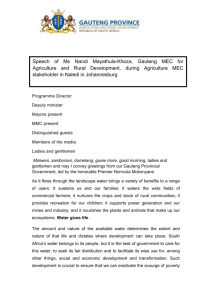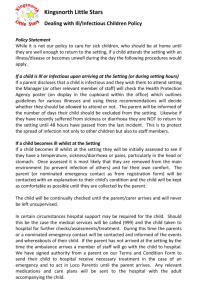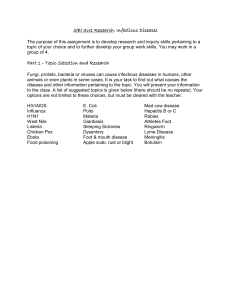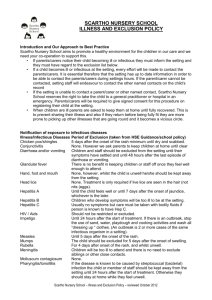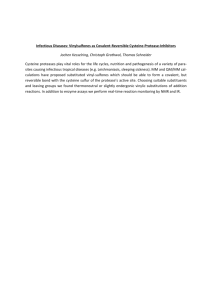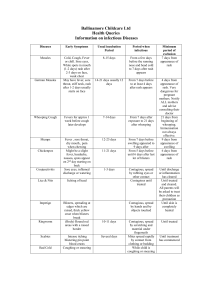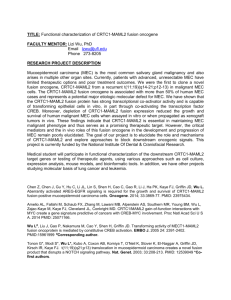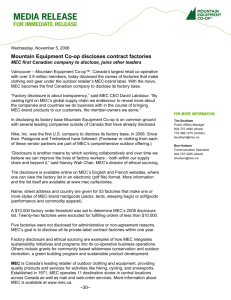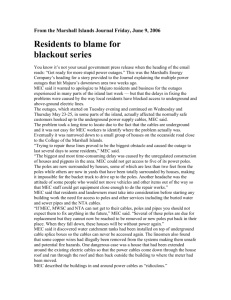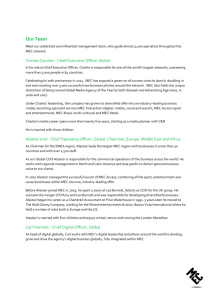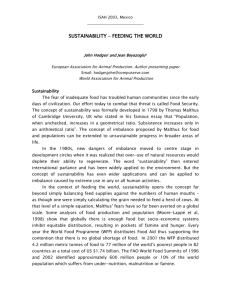Management of Infectious Diseases
advertisement
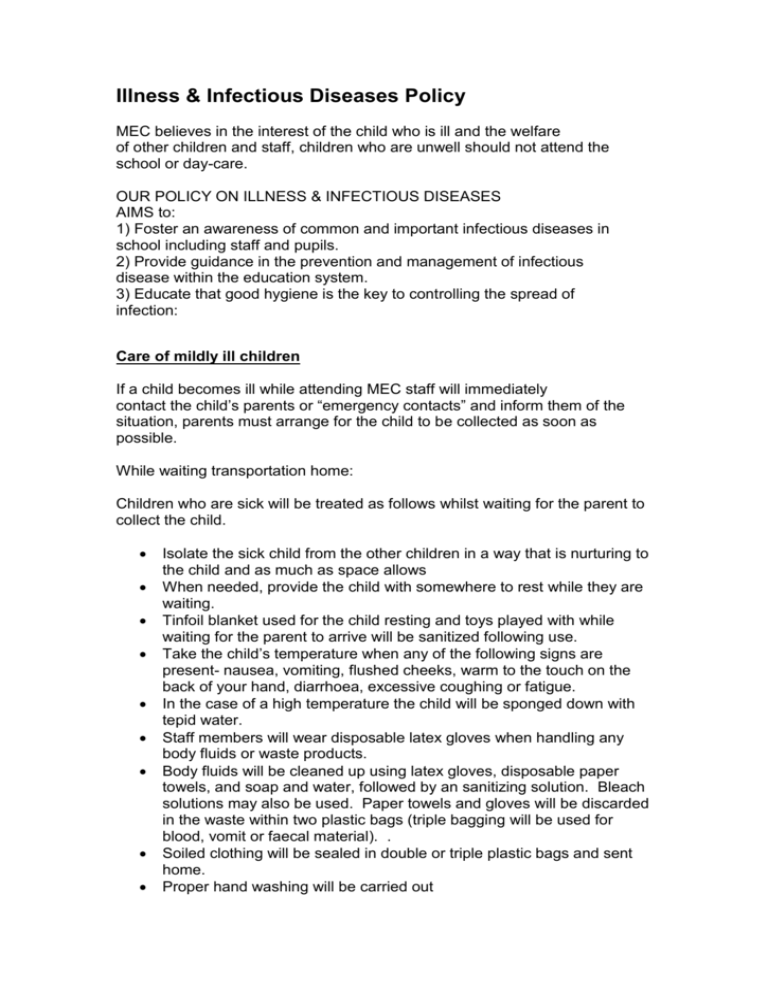
Illness & Infectious Diseases Policy MEC believes in the interest of the child who is ill and the welfare of other children and staff, children who are unwell should not attend the school or day-care. OUR POLICY ON ILLNESS & INFECTIOUS DISEASES AIMS to: 1) Foster an awareness of common and important infectious diseases in school including staff and pupils. 2) Provide guidance in the prevention and management of infectious disease within the education system. 3) Educate that good hygiene is the key to controlling the spread of infection: Care of mildly ill children If a child becomes ill while attending MEC staff will immediately contact the child’s parents or “emergency contacts” and inform them of the situation, parents must arrange for the child to be collected as soon as possible. While waiting transportation home: Children who are sick will be treated as follows whilst waiting for the parent to collect the child. Isolate the sick child from the other children in a way that is nurturing to the child and as much as space allows When needed, provide the child with somewhere to rest while they are waiting. Tinfoil blanket used for the child resting and toys played with while waiting for the parent to arrive will be sanitized following use. Take the child’s temperature when any of the following signs are present- nausea, vomiting, flushed cheeks, warm to the touch on the back of your hand, diarrhoea, excessive coughing or fatigue. In the case of a high temperature the child will be sponged down with tepid water. Staff members will wear disposable latex gloves when handling any body fluids or waste products. Body fluids will be cleaned up using latex gloves, disposable paper towels, and soap and water, followed by an sanitizing solution. Bleach solutions may also be used. Paper towels and gloves will be discarded in the waste within two plastic bags (triple bagging will be used for blood, vomit or faecal material). . Soiled clothing will be sealed in double or triple plastic bags and sent home. Proper hand washing will be carried out Procedures & Guidelines When their child becomes ill, it is essential that parents follow the procedures below to prevent the spread of contagious illnesses to the other children and staff in the MEC. This is obviously important in itself, and also, it will enable us to ensure staff do not contract contagious illnesses and thereby help maintain the child: staff ratio and hence the welfare of all children. Parents must inform the school if they know or suspect that their child has been sick or has a contagious illness. Parents will be notified of any infections in return. MEC encourages two-way communication on all health issues. Children who exhibit symptoms of mild illness, e.g. runny nose, slight rash, slight cough should be kept at home or sent to school according to the following criteria: Body temperature - A child should be fever free for 24 hours. Rashes - Mild rashes which are not accompanied by a fever or behaviour changes should not exclude a child. Gastrointestinal symptoms - A child with diarrhea (more stools than normal, watery, loose, unformed or green coloured, which are not related to medications, or food reactions) should be kept home from school. A child who vomits should not come to school until there has been no vomiting for 24 hours, and the child has been able to hold down solid food and liquids normally. Respiratory - A mild cold accompanied by clear nasal discharge should not exclude a child from school. However, a child who is not eating and drinking normally, can not participate in normal daily activities, has a thick yellow or green nasal discharge, an uncontrollable cough or a sore throat should be excluded. Also, a child whose eyes are red, watery, or producing a yellow or greenish discharge should be kept at home until it is determined that the child is not suffering from an eye infection, particularly conjunctivitis which is extremely contagious. General appearance and behaviour - A child who has a pale look or is acting unusually tired, has loss of appetite, or is irritable should be kept home from school. If children who are in school show any of the above signs we will call a parent/guardian and ask that they collect their child. Parents must not bring in a child into the school during the first 24 hours of any infectious disease, or longer where necessary to prevent the spread of infection. (See guidelines below). Parents will be required to care for their children at home if they are suffering from or show any of the following symptoms: Acute symptoms of food poisoning / gastroenteritis Any contagious / infectious diseases, for example impetigo, chicken pox. An oral temperature which is over 38°C (100.5°F) A severe earache, or a deep hacking cough Severe congestion Difficulty breathing or untreated wheezing An unexplained rash Vomiting (more than twice in the current 24 hours) Diarrhoea (more than twice in the current 24 hours) Is unable to participate comfortably in activities as determined by staff Requires more care than staff can give, which may result in compromising care for the other children Complaints of a stiff neck and headache with one or more of the above symptoms If a child has head lice, they cannot attend the MEC until the hair has have been treated with a medicated shampoo and combed with a lice comb A contagious disease - if a parent or their child or a staff member knows or suspects that they have a contagious disease, they are asked to inform the MEC and to arrange that they visit their doctor to confirm the diagnosis and to receive medication(s) if needed. Parents are requested not to bring in a child during the early days of an antibiotic treatment. It is at the School Managers discretion to allow the child to return to the school after the initial days of absence. The MEC manager may ask the child’s parents to take the child out of the school if she deems that the child is not yet well enough to return. Exclusion Times for Infectious Illnesses and Skin Conditions Chickenpox... Six days from appearance of rash German Measles (Rubella)... Until recovered from symptoms Measles... Four days from appearance of rash Mumps... Until swelling has subsided Whooping Cough... Seven days after starting treatment Conjunctivitis... Until treatment started Impetigo... Until treatment started and infected area has healed over Verrucca... Cover infected area when participating in barefoot activities Scabies... Until treatment started Ringworm... Until treatment started Head Lice... Until treatment started (the whole family should be treated with the recommended lotion which is available at any chemist). Recording of Infectious Diseases All illnesses, which occur within the MEC, will be recorded and any action taken to control the spread will also be documented. All Communicable/Infectious diseases (child, staff or volunteer) must be reported to the MEC in writing within 24 hours. The Manager will send out information alerts/flyers to all within twenty four hours providing that the disease in question has been verified by a GP If a staff member has any of the signs or symptoms described in the child exclusion guidelines, they are to report this to the Manager. If they are diagnosed with a communicable disease they must report this to the Manager within twenty-four hours. Parent (s) or emergency contacts will be notified to pick up their child if he/she appears to have symptoms of a communicable disease or becomes ill.
